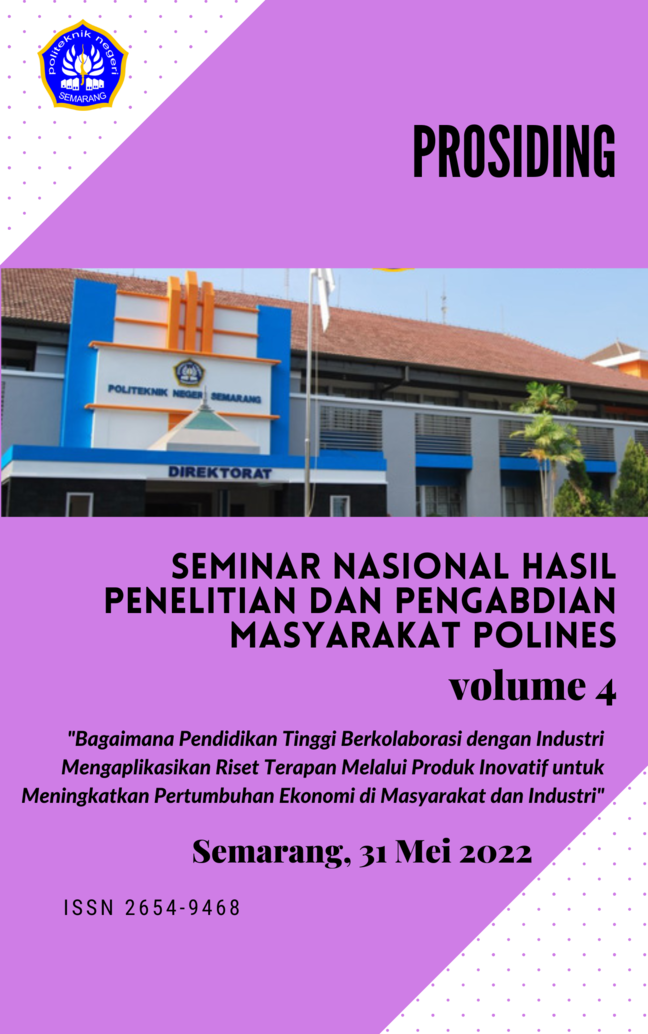PENINGKATAN KINERJA PEMASARAN PELAKU USAHA KULINER WARUNG TEGAL (WARTEG) DALAM MENGHADAPI BENCANA PANDEMI COVID 19 DI JAWA TENGAH
Keywords:
Entrepreneurial Orientation, Innovation Capability, Competitive Maneuverability, Informational Social Impact, Iconic Food Exposure, Marketing PerformanceAbstract
The problem is the phenomenon of the decline of Warteg business actors during the COVID-19 Pandemic. Warteg turnover decreased by an average of 80 percent. Researchers try to bridge the problem of inconsistency as a result of entrepreneurial orientation and innovation capability as well as marketing performance. This study uses competitive maneuverability to find solutions to the findings of business phenomena and research gaps. The sampling technique used in this study is the purposive sampling method in this case, namely Warteg with a minimum number of 205 respondents in 35 districts/cities consisting of 29 districts and 6 cities in Central Java. The analysis technique of this research will use the Structural Equation Modeling (SEM) approach to the competitive maneuverability model. The results of this empirical research become a policy model that is empirically able to provide a good policy foothold for research and government and business policy making, especially Warteg. The research outputs are in the form of suggestions for managerial implications, the formulation of scientific articles, curriculum development and textbook materials. The managerial advice is aimed at the competitive maneuverability policy of Warteg's culinary business in formulating its business development policy in the future.
References
Adomako, S. (2017). The Moderating Effects of Adaptive and Intellectual Resource Capabilities on The Relationship Between Entrepreneurial Orientation and Financial Performance. International Journal of Innovation Management, 1850026. doi:10.1142/S1363919618500263
Asemokha, A., Musona, J., Torkkeli, L., & Saarenketo, S. (2019). Business model innovation and entrepreneurial orientation relationships in SMEs: Implications for international performance. Journal of International Entrepreneurship, 17(3), 425-453. doi:10.1007/s10843-019-00254-3
Bates, M. O., & Buckles, T. A. (2017). An Examination of Market Entry Perspectives in Emerging Markets. International Journal of Business and Economic Development (IJBED), 5(3).
Boojihawon, D. K., Richeri, A., Liu, Y., & Chicksand, D. (2020). Agile route-to-market distribution strategies in emerging markets: The case of Paraguay. Journal of International Management, 100740. doi:https://doi.org/10.1016/j.intman.2020.100740
Chatterjee, S., Dutta Gupta, S., & Upadhyay, P. (2020). Technology adoption and entrepreneurial orientation for rural women: Evidence from India. Technological Forecasting and Social Change, 160. doi:10.1016/j.techfore.2020.120236
Chou, S.-F., Horng, J.-S., Liu, C.-H., Huang, Y.-C., & Zhang, S.-N. (2020). The critical criteria for innovation entrepreneurship of restaurants: Considering the interrelationship effect of human capital and competitive strategy a case study in Taiwan. Journal of Hospitality and Tourism Management, 42, 222-234. doi:10.1016/j.jhtm.2020.01.006
Chuang, Y.-T., & Thomson, K. (2017). Maneuvering multimarket competition: The effects of multimarket contact and strategic alliances on performance of single-market firms. Strategic Organization, 15(3), 390-409.
Ferreira, J., Coelho, A., & Moutinho, L. (2020). Dynamic capabilities, creativity and innovation capability and their impact on competitive advantage and firm performance: The moderating role of entrepreneurial orientation. Technovation, 92-93. doi:10.1016/j.technovation.2018.11.004
Guzmán, C., Santos, F. J., & Barroso, M. d. l. O. (2019). Analysing the links between cooperative principles, entrepreneurial orientation and performance. Small Business Economics. doi:10.1007/s11187-019-00174-5
Hair, J. F., Risher, J. J., Sarstedt, M., & Ringle, C. M. (2019). When to use and how to report the results of PLS-SEM. European Business Review, 31(1), 2-24. doi:10.1108/ebr-11-2018-0203
Han, C., & Zhang, S. (2021). Multiple strategic orientations and strategic flexibility in product innovation. European Research on Management and Business Economics, 27(1). doi:10.1016/j.iedeen.2020.100136
Izquierdo-Yusta, A., Gómez-Cantó, C. M., Pelegrin-Borondo, J., & MartÃnez-Ruiz, M. P. (2019). Consumers”™ behaviour in fast-food restaurants: a food value perspective from Spain. British Food Journal, 121(2), 386-399. doi:http://dx.doi.org/10.1108/BFJ-01-2018-0059
Kiyabo, K., & Isaga, N. (2020). Entrepreneurial orientation, competitive advantage, and SMEs”™ performance: application of firm growth and personal wealth measures. Journal of Innovation and Entrepreneurship, 9(1), 12. doi:10.1186/s13731-020-00123-7
Kohtamäki, M., Heimonen, J., & Parida, V. (2019). The nonlinear relationship between entrepreneurial orientation and sales growth: The moderating effects of slack resources and absorptive capacity. Journal of Business Research, 100, 100-110. doi:10.1016/j.jbusres.2019.03.018
Kosa, A., Mohammad, I., & Ajibie, D. (2018). Entrepreneurial orientation and venture performance in Ethiopia: the moderating role of business sector and enterprise location. Journal of Global Entrepreneurship Research, 8(25), 1-17. doi:10.1186/s40497-018-0110-x
Liu, J., Sheng, S., Shu, C., & Zhao, M. (2021). R&D, networking expenses, and firm performance: An integration of the inside-out and outside-in perspectives. Industrial Marketing Management, 92, 111-121. doi:10.1016/j.indmarman.2020.11.010
Munawar, F. (2019). The Role of Entrepreneurial Orientation and Adaptive Capability to Performance of SME Food & Beverages. Global Business and Management Research, 11(1), 139-151.
Rodrigues, J., Ruivo, P., & Oliveira, T. (2020). Mediation role of business value and strategy in firm performance of organizations using software-as-a-service enterprise applications. Information & Management. doi:10.1016/j.im.2020.103289
Sadeh, F., & Kacker, M. (2020). Performance implications of using signaling and screening for expanding interfirm business networks: Evidence from franchising. Industrial Marketing Management, 88, 47-58. doi:10.1016/j.indmarman.2020.04.008
Sekaran, U., & Bougie, R. (2016). Research methods for business : a skill-building approach. John Wiley & Sons Ltd., Seventh Edition.
Semeen, H., & Islam, M. A. (2020). Social impact disclosure and symbolic power: Evidence from UK fair trade organizations. Critical Perspectives on Accounting. doi:10.1016/j.cpa.2020.102182
Song, H. J., Yoon, Y. N., & Kang, K. H. (2020). The relationship between board diversity and firm performance in the lodging industry: The moderating role of internationalization. International Journal of Hospitality Management, 86. doi:10.1016/j.ijhm.2020.102461
Sulistiyono, D. (2020). Lockdown, Work at Home as Impact Corona Viruses Sustainability of Warteg Traders in Cimahi. Journal of Sustainable Business Hub, 1(1), 12-21.
Užienė, L. (2015). Open Innovation, Knowledge Flows and Intellectual Capital. Procedia - Social and Behavioral Sciences, 213, 1057-1062. doi:https://doi.org/10.1016/j.sbspro.2015.11.525
van Boerdonk, P. J. M., Krikke, H. R., & Lambrechts, W. (2021). New business models in circular economy: A multiple case study into touch points creating customer values in health care. Journal of Cleaner Production, 282. doi:10.1016/j.jclepro.2020.125375
Vaznyte, E., & Andries, P. (2019). Entrepreneurial orientation and start-ups' external financing. Journal of Business Venturing, 34(3), 439-458. doi:10.1016/j.jbusvent.2019.01.006
Yufan, J., Zhou, Z., & Zhou, N. (2019). Brand cultural symbolism, brand authenticity, and consumer well-being: the moderating role of cultural involvement. The Journal of Product and Brand Management, 28(4), 529-539. doi:http://dx.doi.org/10.1108/JPBM-08-2018-1981






